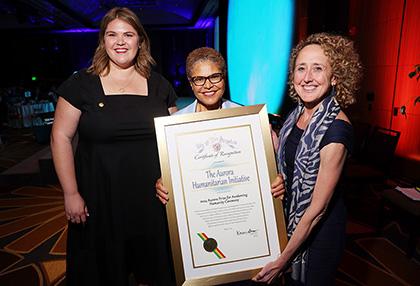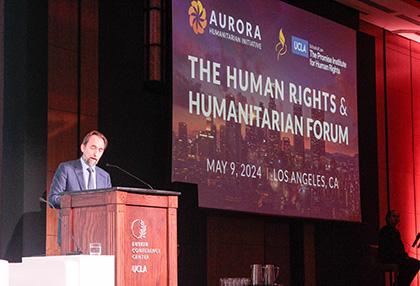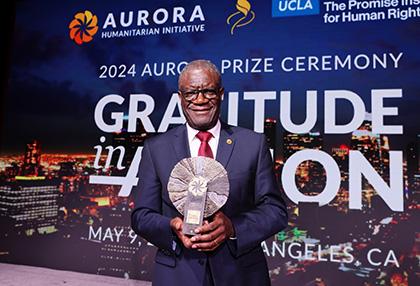The Promise Institute honors human rights defenders at Aurora Prize celebration

In May, The Promise Institute for Human Rights at UCLA School of Law collaborated with the Aurora Humanitarian Initiative to co-host the 2024 Aurora Prize ceremony and three days of related events in Los Angeles, a first in the history of the award and UCLA.
More than 600 attendees from around the world convened on UCLA’s campus from May 8 to 10 to honor and support individuals who work on the front lines in addressing human rights crises around the globe.
“The Promise Institute is a globally recognized authority for human rights education, research, impact and thought leadership,” says Professor Hannah Garry, executive director of The Promise Institute for Human Rights. “We center voices of impacted communities leading in the pursuit of justice for human rights violations, so we were excited to partner with the Aurora Humanitarian Initiative for this remarkable award and proud to be able to co-host this suite of events at UCLA.”
First launched by Armenian Genocide survivors in 2016, the Aurora Prize for Awakening Humanity is awarded annually as an act of gratitude to humanitarians and human rights defenders who are making exceptional impact in advancing human rights and addressing humanitarian crises. Laureates are honored with a $1 million prize to support their work, and they can continue the cycle of giving by nominating other individuals or organizations for the award.
Dr. Eric Esrailian, a co-chair of the events, UCLA professor and chief of the Vatche and Tamar Manoukian Division of Digestive Diseases, was instrumental in the creation of The Promise Institute for Human Rights and remains a major supporter of the institute and UCLA Law. He says, “By shining a light on the best of humanity, which often emerges in the darkest of times, we intend to raise awareness – both in the U.S. and around the world – of ordinary human beings whose sense of compassion and justice motivates them to do extraordinary things, thereby inspiring all of us to do the same.”
In addition to the Aurora Prize ceremony dinner, the institute co-hosted the day-long Human Rights and Humanitarian Forum, which addressed the work and innovations changing the landscape for addressing some of today’s most pressing global challenges. It also presented a screening of the film Aurora’s Sunrise and a conversation between Aurora co-chairs Esrailian and Dr. Noubar Afeyan. The Promise Institute’s cutting-edge impact and partnerships addressing racial injustice, Indigenous rights, the climate emergency and migrants’ rights, while seeking individual, corporate and government accountability for human rights abuse and atrocities, was also featured in a special invitation-only breakfast.
In his opening remarks, UCLA Law Dean Michael Waterstone shared, “I’ve seen us do this time and time again – using our power as an institution to convene and becoming a change multiplier.”
He continued, “I am so proud now to be the dean of a law school that has as one of its core values the pursuit of justice, which makes us so honored to host this conversation analyzing and celebrating the integration of international law and human rights and humanitarian work. This collaboration is critical. In doing this, we are pioneering a framework of action and dialogue that brings together the strengths of both fields. It builds toward future collaborations in the global era. We here at UCLA Law are committed to sustaining these conversations and fostering more in so many ways.”
The Human Rights and Humanitarian Forum provided a special opportunity for global changemakers to convene and discuss an array of critical topics in the world today.
Former U.N. High Commissioner for Human Rights, Zeid bin Ra’ad Al Hussein, who is the president and CEO of the International Peace Institute and a member of The Elders, gave the day’s keynote on rising autocracy and democracy decline.
Together with the executive director of the Aurora Humanitarian Initiative, Garry engaged in fireside chats with the 2024 nominees for the Aurora Prize, who were first announced at the Clinton Global Initiative. The discussion focused on the nominees and their work. They included democracy defender Abdulhadi Al-Khawaja (Bahrain/Denmark); gynecologist and human rights activist Denis Mukwege (Democratic Republic of the Congo); and human rights lawyer for women and opposition activists Nasrin Sotoudeh (Iran).
“Let us take this moment not just as a celebration, but as a renewal of our commitment to fight for a world where humanity shines its brightest.”

More than 55 panelists also participated in break-out sessions, including Nobel Peace Prize laureates, Pulitzer Prize-winning journalists, technology and business leaders, philanthropists and UCLA scholars. Panels centered on pressing themes, including the right to education, forced displacement and refugees, climate change and environmental justice, gender justice, the risks and benefits of A.I., the global healthcare crisis and others.
Later that day, Los Angeles Mayor Karen Bass kicked off the awards ceremony by providing opening remarks and presenting a certificate of recognition on behalf of the city to Garry and Aurora Humanitarian Initiative Executive Director Armine Afeyan.
“I want to express my sincere appreciation for your tireless efforts to make the world a more just and compassionate place,” Mayor Bass said. “The City of Los Angeles well understands the critical impact of exceptional individuals whose courage and dedication have saved and transformed lives worldwide, and we will continue to uplift that work.”
The 2024 Aurora Prize Laureate was announced during the ceremony dinner: Dr. Denis Mukwege is a world-renowned gynecological surgeon and human rights activist who is one of the preeminent leaders in treating survivors of sexual violence in conflict. Mukwege’s Panzi Hospital and Foundation is in the Democratic Republic of the Congo, where he and his team have cared for more than 80,000 women and girls who have been subjected to sexual violence since 1999. His hospital also provides crucial supportive services, including legal aid, psychosocial services and socio-economic reintegration.
Mukwege has fearlessly advocated for accountability for the perpetrators of these crimes, calling for those responsible to be brought to justice - even when they are members of the Congolese government or militia groups. He accepted the Aurora Prize in honor of all the people in the world who are working to fight for gender equality and against rape as a weapon of war.

“Let us take this moment not just as a celebration, but as a renewal of our commitment to fight for a world where humanity shines its brightest,” Mukwege said. “Together, let us continue to awaken hope and nurture the flame of compassion and dignity for survivors of sexual violence.”
“Dr. Mukwege has dedicated his life not only to caring for women and girls suffering from the brutality of sexual violence but also fiercely advocating for their rights,” said Dr. Noubar Afeyan, co-founder of the Aurora Humanitarian Initiative, CEO of Flagship Pioneering, and co-founder and chairman of Moderna. “Aurora is honored to support Dr. Mukwege’s mission to help those in need, demand justice for the victims of sexual violence in war and bring the perpetrators to justice.”
The prize ceremony was rounded out with special performances by violinist Diana Adamyan and Aloe Blacc, who debuted his new single “Shine,” written in honor of the Aurora Prize laureates.
This emphasis on the arts carried through into the next day’s screening of the award-winning animated documentary film Aurora’s Sunrise. Shown at UCLA’s Hammer Museum Billy Wilder Theater, the film was introduced by producer Esrailian and followed by a Q&A with filmmakers Inna Sahakyan and Vardan Hovhannisyan, moderated by Professor Ann Karagozian, who serves as the executive director of The Promise Armenian Institute at UCLA. The film traces the story of Aurora Mardiganian.
The namesake of the Aurora Prize and herself a survivor of crimes of sexual violence, Mardiganian lost everything to the Armenian Genocide at only 14 years old. She managed to escape to New York through extraordinary courage, and her story of survival became a media sensation. She went on to play herself in the silent film Auction of Souls, which was a blockbuster in early Hollywood and launched her as the face of one of the largest and most successful charity campaigns in America for supporting Armenian refugees at the time. Through interwoven animation, interviews with Mardiganian herself and re-discovered, salvaged footage from the silent film, Aurora’s Sunrise connects history to the Aurora Prize Initiative and the urgency of ongoing human rights protections and accountability for atrocity crimes.
Reflecting on the Aurora Prize and surrounding events, Garry says, “These are increasingly dark and turbulent times for our world and basic respect for human rights. Nevertheless, there are countless individuals working tirelessly to bring light and healing where it is needed most. It was an honor to co-host the Aurora Prize events in Los Angeles and at UCLA, home to many courageous human rights activists and progressive leaders over the years. The 2024 Aurora Prize events provided a global platform for connection, inspiration and renewed commitment towards full realization of human rights and justice for all. No less than the survival of our planet depends on it.”